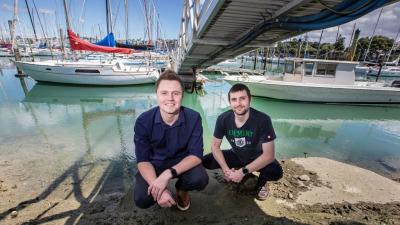Electroclear, a new spin-out company based at Auckland Bioengineering Institute (ABI), is using electric fields to disrupt small organisms’ ability to live on selected underwater surfaces. It is a permanent, non-toxic solution that can be applied to a wide range of geometries.
“We became aware that biofouling was a big problem when we heard about the invasive fanworms in the Auckland harbour,” says doctoral student Christopher Walker.
Walker, and fellow doctoral student and company partner Patrin Illenberger, (both in ABI’s Biomimetics Laboratory) brought their bioengineering training to bear on the problem.
“We had some terrible ideas at first, but then about a year ago we began trialling electric fields underwater,” explains Illenberger.
They discovered that if they set up two separate electrodes underwater and created a fully encapsulated electric field, they could target and disrupt certain organisms.
“These organisms will try to adhere, grow and spore and we try to stop them at every stage.”
Chris Walker
Electroclear has been experimenting at Port Opua (Bay of Islands), Outboard Boating Club (Orakei), and Westhaven Marinas: looking at ways to create electric fields on different surfaces - boat hulls, rope, pontoons - and then connect these to small, land-based power boxes. There are elements of the process they are keeping secret but experiments during which fibreglass panels were hung over the side of a pontoon have proved their method.
“The panels that had an electric field had no organisms attached after 50 days,” says Illenberger, “while the others with no field had bryozoans, algae and barnacles on their surface.”
With the positive results of their marina trials, Electroclear is pushing to get this into more applications.
“As an island nation with such strong ties to our ocean, we have a real chance here to lead the world in anti-fouling and biosecurity,” says Walker.
Applications for this technology seem wide spread, from boat hulls to drainage systems. “The way forward is to dive into applications; we want this technology being trialled in aquaculture and marine infrastructure around the country.”
One of Electroclear’s goals is to develop a database of the different parameters that impact different organisms in different environmental conditions. “Which means a customer may be able to come to us with a problem with a particular algae or larvae in a particular area of the country and we will know the exact electrical field needed to control it,” says Walker.
Electroclear recently won funding and mentor support through the University’s Entrepreneurship programme, Velocity, and is talking with research institutions and commercial partners to develop applications for both marine infrastructure and aqua farms.
As well as Walker and Illenberger, the company includes Associate Professor of Engineering Science Iain Anderson, renowned for pioneering the University’s world-champion, human-powered submarine, Taniwha.
“New Zealand has a unique ecosystem, if you add another creature from somewhere else, this society can be very much upset or disrupted,” says Anderson.
“The end goal for Electroclear is to tackle a problem which is international, a problem that affects a lot of people everywhere, and make the world a better place.”




